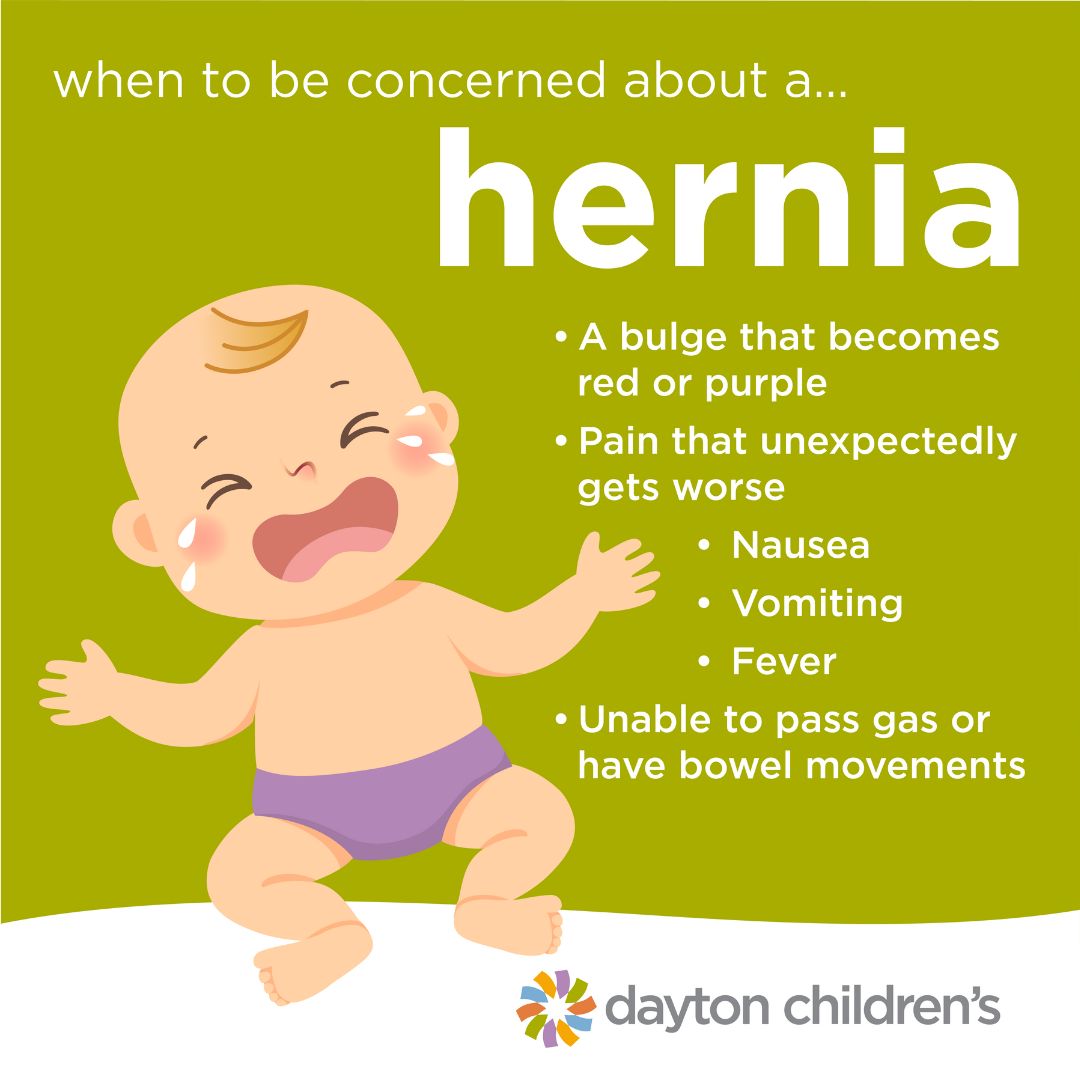blog post
when to be concerned about a hernia

in this article:
- What are the common types of hernias?
- What are the treatment options for my child's hernia?
- When should I seek medical attention for my child?
- What can I expect if my child needs surgery?
Hernias are common in children. While most hernias aren't immediately life-threatening, they don't always go away on their own and can cause serious problems.
It's important to recognize the different types of hernias and when to seek medical care for your child. Dr. Arturo Aranda, division chief of pediatric surgery at Dayton Children's Hospital, shares his recommendations for hernia treatment in children.
what are the common types of hernias?
The two types of hernias most common among children are inguinal hernias and umbilical hernias.
- An inguinal hernia is identified as a bulge in the groin area. About 3 to 5% of full-term babies are born with them. In premature babies, the rate is up to 30%. Both boys and girls can experience them. However, they are more common in boys.
- An umbilical hernia is identified as a bulge or 'outie' of the belly button. The hernia may become more noticeable when your child is crying.
what are the treatment options for my child's hernia?
- If your child has an inguinal hernia, surgery will be needed to close the tunnel and prevent the intestines from pushing through the abdominal wall. The timing of surgery depends on the severity of your child's symptoms but should be as soon as possible after the diagnosis.
- If your child has an umbilical hernia, it is probably nothing to worry about. Most umbilical hernias (80-90%) will close on their own by the time your baby is 4 years old. Surgery will only be needed if the hernia doesn't goa away by age four or five, or the hernia becomes incarcerated. An incarcerated umbilical hernia is when part of the intestine becomes trapped in the abdominal wall.
- Sometimes babies have both inguinal and umbilical hernias. If this is the case, they can be repaired in the same operation.
when should I seek medical attention for my child?
In some cases, an untreated hernia can lead to potentially serious complications. If your child is experiencing any of the following symptoms, seek emergency care:
- A bulge that becomes red or purple
- Pain that unexpectedly gets worse
- Nausea
- Vomiting
- Fever
- Unable to pass gas or have bowel movements
what can I expect if my child needs surgery?
When it comes to hernia surgeries for children, Dayton Children's provides flexible and convenient options to meet your family's needs. This includes the convenience of scheduling or requesting an appointment with a pediatric surgeon without needing a referral.
Our pediatric surgery team is dedicated to offering individualized care and ensuring a smooth process from consultation to recovery.
We are proud to be one of the few centers in the nation offering both traditional and minimally invasive surgical techniques for umbilical and inguinal hernias.
Regardless of the type of hernia or surgery, the procedure is outpatient, allowing you to return home with your child shortly after their surgery is finished.
We offer two options for hernia surgery:
- Two-visit option:
- During your first appointment, you and your child will meet with one of our highly skilled and experienced surgeons, who will guide you through the process with their expertise and care.
- If surgery is necessary, we will schedule it on a day that best suits your schedule.
- This means you'll come to the hospital twice: once for the appointment and once for the surgery.
- Same-day surgery option:
- A more convenient option available at our south campus in Springboro.
- Instead of two appointments your child will be seen by the surgeon and have surgery on the same day.
- Before the appointment, our team will provide all the information you need to prepare for surgery.
- The whole process takes about three to four hours.
- The same-day surgery option means fewer trips to the hospital and less time overall.
who can use the same-day surgery option?
- Kids with umbilical hernias who are 3 years of age or older.
- Kids with inguinal hernias between 6 months and 14 years of age.
- Children without a complex medical history. Those with a complex medical history should utilize the traditional option and schedule an appointment in our surgery clinic.
schedule an appointment
To request a same-day surgery appointment, please complete the form below.
request a same-day surgery appointment
If you prefer the traditional option for care, you can use online scheduling to find a time and location that works best for you.
schedule a surgery clinic appointment





